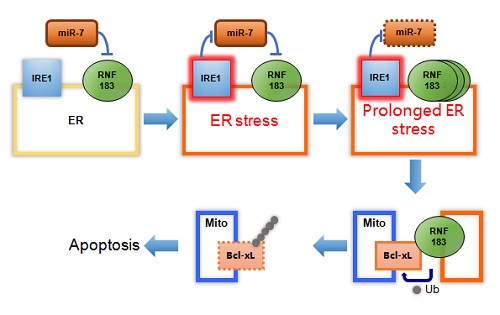The study entitled “Transmembrane E3 ligase RNF183 mediates ER stress-induced apoptosis by degrading Bcl-xL” was published online on March 5, 2018. This work identified an ER anchored E3 ligase RNF183. It is up-regulated by prolonged ER stress, ubiquitinates Bcl-xL and causes its degradation and subsequent apoptosis.
The accumulation of unfolded proteins in the ER is a pathological condition observed in many diseases, including cancer, diabetes, and neurodegenerative diseases. Failure to relieve the cellular stress via the adaptive mechanisms of the unfolded protein response (UPR) activates apoptotic cell death. Prevention of unwanted apoptosis induced by prolonged ER stress is considered a valuable therapeutic strategy in many diseases. However, the mechanism of apoptotic initiation and execution in sustained ER stress is not clear. The complication of UPR signaling suggests that unknown pathways have yet to be discovered.
Researchers at Institute of Biophysics (IBP) identified a novel membrane-anchored RING finger protein, RNF183. It is specifically induced by prolonged ER stress. RNF183 localizes to the ER and its cytosolic RING finger possesses E3 ligase activity. The induction of RNF183 is controlled by IRE1, not the PERK pathway, and involves miR7. RNF183 interacts with anti-apoptotic factor Bcl-xL, ubiquitinates the protein and causing its degradation and subsequent apoptosis. Depletion of RNF183 preserves the levels of Bcl-xL and alleviates apoptosis triggered by prolonged ER stress. These findings represent a previously unidentified mechanism for ER stress-induced apoptosis. It also implies that manipulation of RNF183 activity may help control cell fate in pathological conditions and suggests that the close contact between the ER and mitochondria play a key role in cellular signaling.
Prof. Junjie Hu at IBP of the Chinese Academy of Sciences (CAS) is the corresponding author. Yanfang Wu and Xia Li from the Hu group share the first authorship. This work was supported by the National Key Research and Development Program and the National Natural Science Foundation of China.
Article link: http://www.pnas.org/content/early/2018/03/01/1716439115

A model for RNF183-induced apoptosis during prolonged ER stress
Contact: Junjie Hu
Institute of Biophysics, Chinese Academy of Sciences
Beijing 100101, China
Phone: 86-10-64886852
Email: huj@ibp.ac.cn